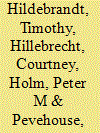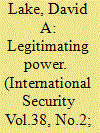|
|
|
Sort Order |
|
|
|
Items / Page
|
|
|
|
|
|
|
| Srl | Item |
| 1 |
ID:
124578


|
|
|
|
|
| Publication |
2013.
|
| Summary/Abstract |
The debate around humanitarian intervention and the responsibility to protect generally concerns a collective action problem on the international level: motivating states to participate in a multilateral coalition to stop a mass atrocity. This debate presupposes that states enjoy a domestic consensus about their rights and responsibilities to intervene. This article reconsiders this assumption and examines the sources of domestic political will for intervention, particularly the role of partisanship, ideology, and public opinion on Congressional members' willingness to support US intervention for humanitarian purposes. We analyze several Congressional votes relevant to four episodes of US humanitarian intervention: Somalia, Haiti, Bosnia, and Kosovo. We find that public support for humanitarian intervention increases Congressional support and that other political demands, primarily partisanship and ideological distance from the president, often trump the normative exigencies of intervention. Our findings shed light on the domestic political dynamics behind humanitarian intervention and can help explain why some recent humanitarian missions have proceeded without seeking Congressional approval.
|
|
|
|
|
|
|
|
|
|
|
|
|
|
|
|
| 2 |
ID:
124375


|
|
|
|
|
| Publication |
2013.
|
| Summary/Abstract |
The United States has maintained international hierarchies over the Western Hemisphere for more than a century and over Western Europe for nearly seven decades. More recently, it has extended similar hierarchies over states in the Middle East. How does the United States exercise authority over other countries? In a world of juridically sovereign states, how is U.S. rule rendered legitimate? Hierarchy has interstate and intrastate distributional consequences for domestic ruling coalitions and regime types. When the gains from hierarchy are large or when subordinate societies share policy preferences similar to those of the United States, as in Europe, international hierarchy is possible and compatible with democracy. When the gains from hierarchy are small and the median citizen has policy preferences distant from those of the United States, as in Central America, international hierarchy requires autocracy, and the benefits of foreign rule will be concentrated within the governing elite. In the Middle East, the gains from hierarchy also appear small, and policy preferences are distant from those of the United States. As a result, the United States has backed sympathetic authoritarian rulers. Although a global counterinsurgency strategy might be viable over the long term, the costs of establishing effective hierarchies in the region imply that the United States is better off retrenching "East of Suez."
|
|
|
|
|
|
|
|
|
|
|
|
|
|
|
|
|
|
|
|
|